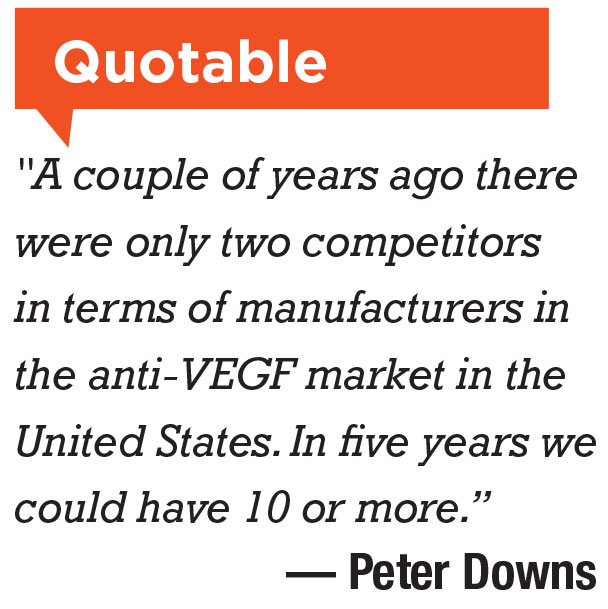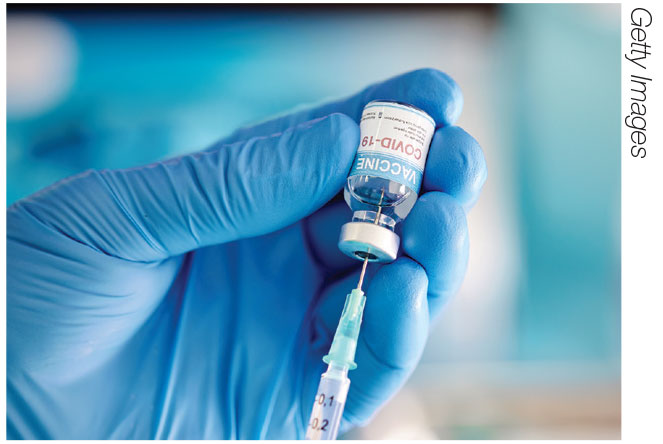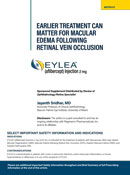With the recent approvals of the Susvimo ranibizumab port delivery system and the Samsung Bioepis-Biogen Lucentis biosimilar, scheduled to launch next summer, the market for anti-VEGF therapies is about to enter a new era of heightened competition that will cause downward pressures on drug prices.
Peter Downs, an author and analyst with Market Scope, a medical market data and analytics firm, gave that assessment during the OIS Retina@ASRS meeting last month.
“A couple of years ago there were only two competitors in terms of manufacturers in the anti-VEGF market in the United States,” Mr. Downs said at the OIS meeting, meaning, of course, Genentech/Roche with Lucentis (ranibizumab) and Regeneron Pharmaceuticals with Eylea (aflibercept). Novartis’ Beovu (brolucizumab), approved in 2019, makes three. Byooviz, Samsung Bioepis-Biogen Lucentis biosimilar, would make four.
 |
With at least two more investigative Lucentis biosimilars and Outlook Therapeutics’ ophthalmic formulation of Avastin (bevacizumab) “hot on their heels,” and other anti-VEGF treatments in Phase III trials, “In five years we could have 10 or more manufacturers competing in this space,” Downs said.
Susvimo pricing
That doesn’t even take into account Susvimo, which Genentech says it will price competitively with existing anti-VEGF platforms. For the first six months, the price of Susvimo is $9,250, which includes the implanted device and medicine, Shirley Dang, senior manager of corporate relations at Genentech, tells Retina Specialist. Refills will cost $8,000 every six months—the on-label interval. That adds up to a first-year price of $17,250, which Genentech says is 26 percent less than the yearly price of monthly Lucentis injections.
“As with all of its medicines, Genentech has taken a thoughtful and responsible approach to determining the price of Susvimo, and is committed to partnering with governments, regulatory and reimbursement authorities and non-governmental stakeholders to identify solutions that will help ensure its medicines are accessible for patients who need them,” Ms. Dang says.
Mr. Downs has tracked the anti-VEGF prices Medicare pays since Lucentis was approved in 2008, and they have dropped steadily, according to Market Scope data. The Medicare price of Lucentis has gone from $2,025 a dose in 2008 to $1,535 this year. Eylea entered the market in 2012 at $1,961 a dose, just under the Lucentis price point at the time, falling to $1,833 this year. Even Beovu has seen a decline in price after only a year on the market, from $1,905 to $1,865 per dose.
Real-world costs
Of course, true annual costs vary depending on the treatment interval. Lucentis is approved for monthly dosing, Eylea for every four weeks and up to eight weeks after three monthly loading doses, and Beovu for eight to 12 weeks after three loading doses. Add on top of that the treat-and-extend protocols retina specialists favor, and using 12 monthly injections to calculate annual cost probably only applies to a minority of patients.
While Susvimo, which had been called the Port Delivery System with ranibizumab (PDS) in clinical trials is FDA-approved for refilling every six months, the real-world interval may be longer. In the Phase II Ladder trial of PDS,1 the median time to the first refill was 15.8 months for patients who received the 100-mg/ml formulation, the FDA-approved formulation for Susvimo.
In any event, the original price of Lucentis has proved to be a “ceiling rather than a floor,” Mr. Downs says in an interview.
The impact biosimilars have had in other therapeutic areas, most notably oncology and rheumatology, may foretell the impact they’ll have in ophthalmology, he says. “So the first biosimilar comes in around 80, 85 percent of price,” he says. “But by the time you get the third one, it typically comes in at about 60 percent of the reference price.” An unforeseeable factor is how quickly retina specialists accept biosimilars.
Another factor is the impact Avastin has in the market. Outlook Therapeutics’ is developing an ophthalmic bevacizumab formulation, which would potentially cut out the specialty pharmacies that repackage the oncology drug for intravitreal injections. But its impact in the anti-VEGF market, adds Mr. Downs, “is very cloudy right now.” RS
See related story: “Five things to know about biosimilars in retina.”
REFERENCE
1. Khanani AM, Callanan D, Dreyer R, et al; on behalf of the Ladder Investigators. End-of-study results for the Ladder Phase 2 trial of the Port Delivery System with ranibizumab for neovascular age-related macular degeneration. Ophthalmol Retina. 2021;5:775-787.
In BriefBausch + Lomb and Clearside Biomedical report that he Food and Drug Administration has approved XIPERE (triamcinolone acetonide injectable suspension) for suprachoroidal use for the treatment of macular edema associated with uveitis. The FDA also granted 510 (k) approval for iCare USA to distribute the EIDON ultra-widefield lens module in the United States. The module enables the capture of 120-degree images of the retina in a single frame or up to 200 degrees with a mosaic function. The FDA has also accepted Novartis’ supplemental Biologics License Application (sBLA) application to add diabetic macular edema as an indication for Beovu (brolucizumab). GenSight Biologics has received FDA Fast Track Designation for GS030, which combines adeno-associated virus 2-based gene therapy with optogenetics to treat retinitis pigmentosa. PIONEER is a Phase I/II trial evaluating GS030 in patients with late-stage RP in the United Kingdom, France and United States. |
Vaccine hesitancy comes to the retina practice
Like employers everywhere, retina specialists are dealing with staff members who refuse to get vaccinated against the COVID-19 virus. Three retina specialists who commented on staff vaccinations during the COVID symposium at the American Society of Retina Specialists meeting in San Antonio last month share their experiences and thoughts on staff vaccines.
“I think that all medical staff should be vaccinated, and I feel a moral obligation myself to get vaccinated and I think the staff should feel that way as well,” says John Thompson, MD, partner at Retina Specialists, a three-location practice in Maryland. “But I also understand that people feel like they have individual freedoms and this becomes an ethical conflict between the rights of the individual versus the rights of society.”
 |
|
A cause for controversy at retina clinics. |
He tells about a “good staff member who is very religious” who left the practice because she refused to get the vaccine. “The interesting thing about it is this young lady got COVID and her father got COVID back in earlier 2021,” Dr. Thompson says. “Her father died from COVID, and yet she still refuses to get vaccinated. It just goes to show how strong somebody’s religious beliefs can be.”
“Thankfully the substantial majority of our staff are vaccinated,” says Sunir Garg, MD, codirector of retina research at the Retina Service of Wills Eye Hospital, Philadelphia, and a partner with Mid Atlantic Retina, a 17-location practice in Pennsylvania, New Jersey and Delaware. “Our clinical staff’s vaccination rates are high, and vaccination rates are improving for our back office and billing staff.”
He notes that federal, state and local mandates have “encouraged some of our staff that were otherwise on the fence to get vaccinated.” He adds, “As we’ve seen in some hospital systems, a few of our staff told us that if they have to get vaccinated due to mandates, they are going to leave to get jobs that don’t require vaccination. How do you navigate those waters?
“It’s definitely a big issue. In this tight labor market, hiring staff has been tough enough without this additional challenge,” Dr. Garg says. “Anyone leaving for other jobs over vaccination requirements is a big concern. Whether it is clinical or administrative personnel, if we don’t have sufficient support then we cannot do our jobs. Ultimately, our patients suffer if we can’t provide timely care.”
“I think it makes sense to require vaccinations,” says Abdhish Bhavsar, MD, of The Retina Center, a three-office practice in Minnesota. “Navigating them is a human resource issue, and it should be done well, thoughtfully and appropriately, but it makes sense.”
He cites a recent publication that reported that 0.5% of vaccinated healthcare workers were COVID symptomatic positive, and had persistent shedding of the virus for 30 days or more afterward. “We have to be aware of that even with vaccinations we still can get COVID,” Dr. Bhavsar says. “Vaccination for the major diseases that we can transmit to others, including our patients and staff should be required for all healthcare workers, including COVID and even the flu.” RS
Medicare cracking down on -25 modifier use
Medicare seems to be gearing up for more vigorous enforcement of use of the -25 modifiers for intravitreal injections, attendees at the American Society of Retina Specialists meeting were told.
 |
|
John Thompson, MD, says the Office of Inspector General is ramping up audits of intravitreal injections. |
In an interview, John Thompson, MD, explains the rationale for that conclusion: the Office of Inspector General of the Department for Health and Human Services, the agency that runs Medicare, issued a workplan in 2019 that stated as much. He relays the story of a retina practice that received an audit letter about two years ago, and submitted its records soon after that. After a lull during the COVID-19 pandemic, the practice received a follow-up notice last spring that the OIG was resuming its action.
The challenge for retina specialists is that they use the -25 modifier for intravitreal injections at a rate much higher than other ophthalmologists. Medicare hasn’t given clear guidance on when it is or isn’t appropriate to use the modifier to charge for an office visit on the same day as an intravitreal injection.
“I’m not sure they truly understand the difference between a retina specialist and an ophthalmologist, and that’s part of the problem,” Dr. Thompson says of the OIG auditors. “Because virtually every retina specialist is an outlier compared to a comprehensive ophthalmologist or a glaucoma specialist, because we use the -25 modifiers in patients that are examined on the same day as an intravitreal injection, something that happens much less frequently in non-retina practices.”
As for a practice that’s already under audit, Dr. Thompson says, “I think the best word of wisdom I can give is you need to hire an attorney,” preferably one well-versed in Medicare audits and, if possible, specifically retina. RS
See related story, Coding Commentary, “Documenting IVI: Avoiding audit traps."
—Richard Mark Kirkner



